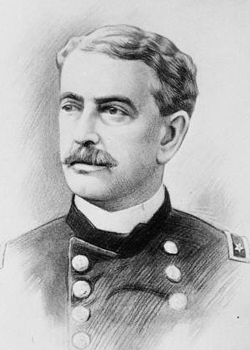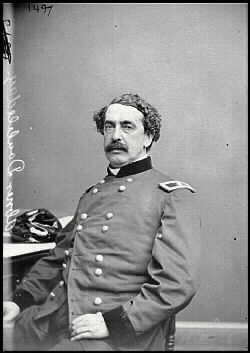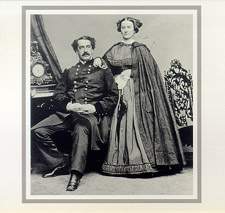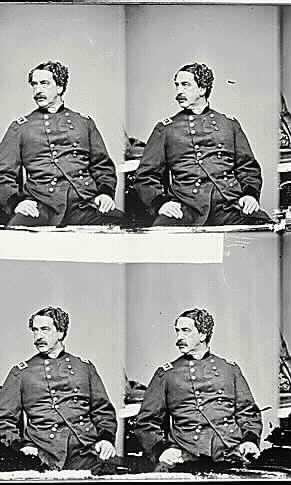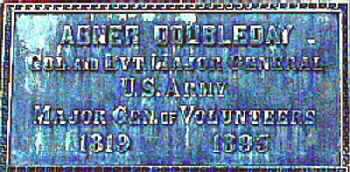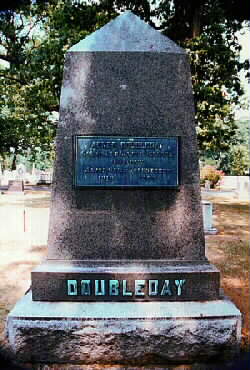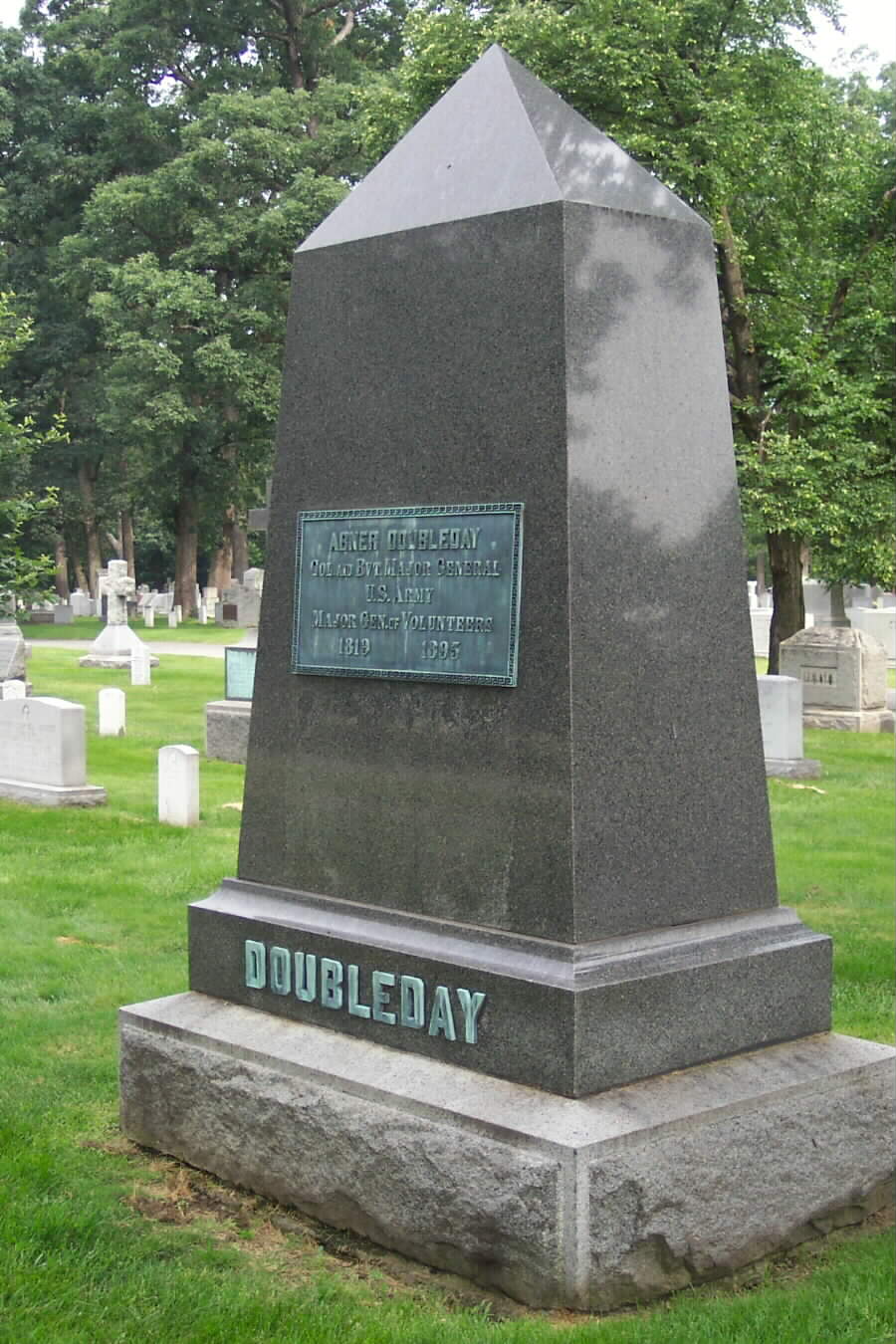Abner Doubleday was born in upstate New York of a family outstanding in military and civil life, he graduated from West Point in 1842, 25th in a class of 56, and was assigned to the Artillery-Infantry.
He is popularly credited with inventing the modern game of baseball in 1835.
Before entering West Point, he had been a civil engineer for two years. He served in the Mexican and Seminole Indian Wars and was at Fort Sumter when it was attacked, signaling the beginning of the Civil War. He aimed the first Union gun that was fired in defense of the fort.
He served under General Patterson in the Shenandoah Valley, June-August 1861. He was appointed Brigadier General, United States Volunteers, February 3, 1862 and led the 2nd Brigade, 1st Division, III Corps at Second Bull Run and took command of the Division on August 30 when General Hatch was wounded. He again led the Division at South Mountain, Antietam and Fredericksburg. He was promoted to Major General, USV, November 9, 1862 and commanded 3rd Division, I Corps, at Chancellorsville, and headed that Corps when General John Reynolds was killed in the Battle of Gettysburg, July 1, 1863.
He then had administrative duties for the remainder of the war, except when he took command of portions of the Washington, D. C. defenses against Early’s raids in 1864. He retired from the Army in 1873 and he moved to San Francisco, where he established the first cable car company in that city. He later moved to Mendham, New Jersey, where he died on January 26, 1893. He was buried in Section 1 of Arlington National Cemetery.
He was the author of “Reminiscences of Fort Sumter and Moultrie in 1860-61,” (1876); and “Chancellorsville and Gettysburg,” (1882). A statue of him stands on the Battlefield at Gettysburg.
His wife, Mary, who died in 1907 is buried with him.
Abner Doubleday
June 26, 1819 – January 26, 1893
Abner Doubleday, born one of three sons to Ulysses and Hester Doubleday on June 26, 1819, in Ballston Spa, New York, was schooled at Auburn and Cooperstown, New York. Doubleday planned a career in civil engineering, but in 1838 he was appointed to West Point. He graduated in 1842 with a commission in the artillery, and served in the Mexican and Seminole Wars. In 1852-53, Doubleday became a member of a commission investigation allegations of fraud during the Mexican War. Doubleday was known for his dignified and courteous manner and he used no profanity, liquor, or tobacco.
Doubleday was promoted to first lieutenant in 1847 and to captain in 1855. Stationed in Charleston Harbor in 1860-61, Doubleday fired the first Union shot from Fort Sumter after the Confederate ironclad battery bombardment of that fort. Next appointed major of the 17th Infantry in May 1861, Doubleday served in the lower Shenandoah Valley and in the defense of Washington. Later, he became brigadier general of volunteers, assigned to command a brigade in Union Gen. Irvin McDowell’s corps. He saw action on the Rappahannock, at 2d Bull Run, and as commander in the battles of South Mountain, Antietam, and Fredericksburg.
In 1863, as major general of volunteers, Doubleday commanded the fighting at
Gettysburg. On the first day, Doubleday led the Union troops in their repulse of the Confederate army until reinforcements arrived. Doubleday’s top commander, Gen. George G. Meade, was not, however aware of all of the facts concerning Doubleday’s meritorious service and Doubleday’s division’s credit for the ultimate Union victory on the third day of Gettysburg. Therefore, Doubleday did not earn the permanent command of his division; instead it was given to former West Point classmate John Newton, and Doubleday was returned to a lesser command.
Doubleday retired from active service in 1873 and made his home in New Jersey, where he died twenty years later.
Fascinating Fact: Although controversy exists about Doubleday’s status as the creator of baseball, a 1907 commission, investigating all sides of the issue, gives official credit to him.
PAUL POST, The Saratogian
3 April 2005
BALLSTON SPA, NEW YORK — His name is world famous as the inventor of baseball.
In reality, Abner Doubleday’s true claim to fame lies with his Civil War heroics.
In 1907, a special baseball commission recognized Doubleday as baseball’s founder based on the testimony of a boyhood friend named Abner Graves.
‘It’s all part of American mythology and folklore, like Paul Bunyan and John Henry,’ said Jim Gates, library director at the National Baseball of Fame & Museum in Cooperstown. ‘But folklore is an important part of the American story.’
Doubleday was born in Ballston Spa on June 26, 1819, and graduated from West Point in 1842, which puts him at the U.S. Military Academy when Graves said he was supposedly playing baseball in Cooperstown, in 1839.
The Mills Commission, created by sporting good magnate Albert Spalding in 1905, undertook a nationwide effort to determine baseball’s origins and settled on Graves’ written testimony as the most acceptable story.
‘His letter is full of holes,’ Gates said. ‘It’s a weak document at best.’
Further complicating matters, Doubleday had a cousin also named Abner, 15 years his junior, who lived in Cooperstown. Graves and the cousin were the same age, so it’s now believed that Graves was actually referring to him, not Ballston Spa’s Abner Doubleday who went on to Civil War fame.
It wasn’t until 1953 that Congress, citing the work of a New York City librarian, declared that Alexander Cartwright was baseball’s true founder. Cartwright was involved with the earliest forms of organized professional baseball, in metropolitan New York, but his designation as baseball’s founder is no more legitimate than Doubleday’s.
Just last year, officials in Pittsfield, Massachusetts, uncovered records from the late 1700s that mention the game being played there.
‘That’s the latest discovery,’ Gates said. ‘We look forward to the next one. There is no specific birthplace or birth date. Baseball evolved from a variety of stick- and-ball games played at various places throughout the nation.’
Doubleday’s contributions to baseball might be mythical but they endure as part of the game’s fascinating framework in the American psyche. The Mills Commission’s report also laid the basis for Cooperstown’s selection as the ‘Birthplace of Baseball.’
Regardless of its validity, the choice couldn’t have been much better.
‘As someone once told me, if baseball wasn’t invented here, it should have been,’ Gates said. ‘It’s the perfect setting for the Hall of Fame.’
In stark contrast to his baseball connections, there is nothing fabricated about Doubleday’s record as a military officer. His grandfather had fought in the American Revolution and his father was a U.S. congressman.
Entering West Point in 1838, Doubleday was assigned to the artillery-infantry upon graduating, served in the Mexican War and took part in a campaign against the Seminoles in Florida in the 1850s.
He was stationed at Fort Sumter in Charleston, South Carolina, in 1861 and is credited with firing the Union’s first shot in the battle that opened the Civil War. A captain then, he was later named Major, Brigadier General and finally Major General in November 1862.
His combat experience includes the Second Battle of Bull Run, South Mountain, Antietam (where he was wounded) and Fredericksburg. He also played a key role at Gettysburg, taking command of Union troops when Major General John J. Reynolds was killed on the battle’s first day. Doubleday’s 1st Corps repulsed Confederates, fighting under Robert E. Lee, until reinforcements arrived and his division is largely responsible for the Union’s eventual victory at Gettysburg.
But his commander, General George Meade, had a dim view of Doubleday based on past combat performances. Unaware of the extent of Doubleday’s feats, Meade wouldn’t give him permanent division command and replaced him with a less experienced general.
He was relegated to administrative duties for most of the war’s remainder but stayed in the army until retiring in 1873. Doubleday then moved to San Francisco, where he established the city’s first cable car company. He also wrote two books, ‘Reminiscences of Fort Sumter and Moultrie in 1860-61’ and ‘Chancellorsville and Gettysburg.’ Two monuments at Gettysburg are dedicated to Doubleday.
He later moved to Mendham, New Jersey, where he died on January 26, 1893, but his diaries never make mention of baseball. He is buried at Arlington National Cemetery.
A so-called ‘Doubleday Ball’ was found in a Cooperstown house many years after the Mills Commission’s report was issued, further supporting its claims. The house where the tattered old ball was discovered had some connection to the Doubleday family.
Proponents of the story seized this information as proof positive that Abner Doubleday had in fact invented baseball.
‘It was at one time thought to be true for a long period of time,’ said Tim Wiles, the Hall of Fame’s director of research. ‘It hasn’t sunk in to a lot of Americans, even today. It’s still an important myth in the game’s intellectual and emotional evolution.
‘You have to have a starting point.’
If nothing else, Cooperstown perpetuates the romantic notion of small-town, rural boys playing baseball on idyllic summer afternoons. Movies such as ‘Field of Dreams’ and ‘The Natural’ wouldn’t have the same impact if it could be proved that baseball was invented in New York City’s Hell’s Kitchen, for example.
‘Clearly, there were kids like Abner Doubleday playing baseball,’ Wiles said. ‘The roots of the game extend back to places like Ballston Spa and Cooperstown. This is the kind of place where baseball could have originated. It’s a good representation of where baseball comes from.’
John Thorn of Kingston is a nationally renowned baseball historian and author.
‘I think Abner Doubleday is a nice father figure for the game,’ he said. ‘For historians and students of the game, it’s no more helpful than Santa Claus, Zeus or the Easter Bunny.’
Thorn readily acknowledges that Doubleday distinguished himself with many great accomplishments during his lifetime.
‘One of these accomplishments is not the invention of baseball,’ he said. ‘It’s kind of like George Washington and the cherry tree. It draws a useful legend for children and it has a sweet sound to it for adults.’
DOUBLEDAY, MARY H
DATE OF DEATH: 03/13/1907
DATE OF INTERMENT: Unknown
BURIED AT: SECTION OFFRS SITE LOT 61
ARLINGTON NATIONAL CEMETERY
WIFE OF ABNER DOUBLEDAY
CBMG USA RTD
Photos Courtesy of the Library of Congress
Michael Robert Patterson was born in Arlington and is the son of a former officer of the US Army. So it was no wonder that sooner or later his interests drew him to American history and especially to American military history. Many of his articles can be found on renowned portals like the New York Times, Washingtonpost or Wikipedia.
Reviewed by: Michael Howard

